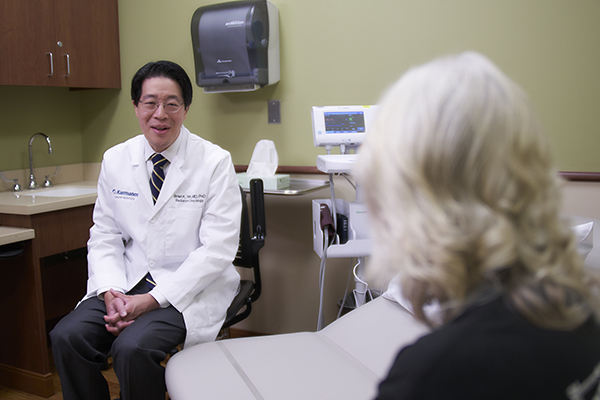Proton therapy is a form of radiation that offers greater precision, resulting in fewer side effects
Author: Jasmine Brown

“Depending on the location and size of the tumor located in the lung, with the technology that we have at the McLaren Proton Therapy Center, we can calculate the angle that we need the beam to travel, as well as the depth, all while avoiding treatment to the nearby organs that are not affected by cancer.”
Proton therapy has been a tool to fight cancer and spare healthy tissue and organs for some time now. For example, if you are diagnosed with lung cancer and traditional radiation therapy is offered as a cancer treatment option, ask your physician about proton therapy. Depending on where the tumor is in your lung, proton therapy specialists may be able to avoid delivering excess radiation to your heart, diaphragm, liver, sternum, spinal cord, and other nearby healthy organs and tissue.
With that targeted care, patients have a greater chance at a better quality of life post treatment.
“Proton therapy is a unique treatment, but it is much needed for so many cancer cases,” explained Brian Yeh, MD, PhD, radiation oncologist at the McLaren Proton Therapy Center and medical director of radiation oncology research at Karmanos Cancer Institute at McLaren Flint.
“It is a more focused and precise form of radiation, compared to X-ray therapy. Proton therapy gives us the ability to avoid nearby healthy tissue, only treating the target, or the tumor, that we want to eliminate.”
With proton therapy, experts at the McLaren Proton Therapy Center, part of Karmanos Cancer Network, can deliver the proton radiation to the depth of the tumor, where the beam slows down and stops. Compared to conventional radiation, also known as X-ray therapy, the photons travel through the body, creating an exit dose. This means organs and tissue that are located within the path of the beam are exposed to the radiation.
“Depending on the location and size of the tumor located in the lung, with the technology that we have at the McLaren Proton Therapy Center, we can calculate the angle that we need the beam to travel, as well as the depth, all while avoiding treatment to the nearby organs that are not affected by cancer,” said Dr. Yeh. “Those areas are not the focus of the cancer treatment. There are so many important structures and organs located behind the chest area, such as the heart, non-disease areas of the lung, and the spinal cord – we only want to treat the area of the lung where the cancer is located, and we are able to do that with proton therapy.”
Though a person may receive proton therapy treatment, often lung cancer requires a multidisciplinary approach. A lung cancer patient may have a team of doctors in addition to their radiation oncologist for proton therapy treatments.
The comprehensive team of radiation, surgical, and medical oncologists at Karmanos Cancer Institute at McLaren Flint work closely to determine an individualized treatment plan for each patient. Some patients may have to undergo surgery to remove the tumor or receive drug therapy treatments, such as chemotherapy. Some patients may receive all three types of treatments.
“Everyone’s cancer is different. We determine what works best for each patient and allow the patient to decide their path of treatment,” Dr. Yeh said. “Proton therapy may not always be the best treatment option for every lung cancer patient. In fact, some of my lung cancer patients have received traditional radiation therapy due to our ability to treat their tumor with X-rays. However, proton therapy is worth exploring to potentially avoid exposing organs that do not need to be treated with radiation.”
If you have been diagnosed with lung cancer or any of the cancers listed here, and you are looking for a second opinion to see if proton therapy is a treatment option for you, call (855) 697-7686 or visit mclaren.org/proton_forme.
To schedule a lung cancer screening or for resources to help you quit smoking, visit karmanos.org/flintlungscreening.